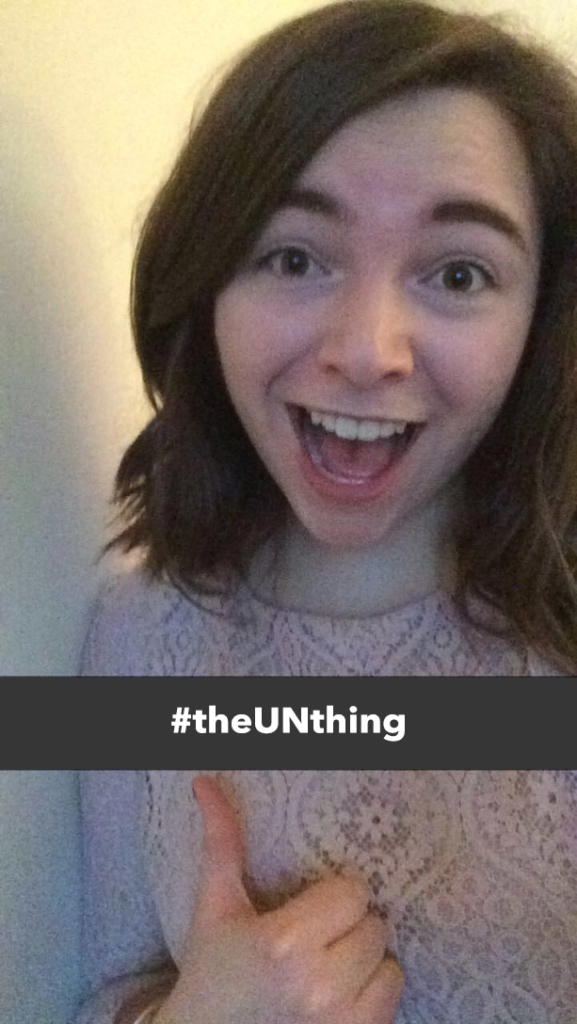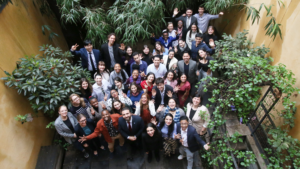
You’re at a party. You may be the proud-but-slightly-stressed-out host; you may be that person in the middle of the room fabulously talking to everyone; or you may be that person petting the host’s dog, happily making a new friend. That person is usually me, and I’ve bonded with many a friend’s pupparoos. Wherever you are at this party, you look up and see Person A and Person B discuss whatever just happened in the news at home or abroad. You are intrigued and then you may slowly zone out based on the discussion. It’s over my head and out of my control. I’m going to change the culture by being present to my future patients, I once thought during this exact scenario at a graduation party during my senior year of high school.
Flash-forward a year: I’m on a lunch date with a journalism major in my freshman year of undergrad. I mention I love researching culture. He suggests I join a group that goes to the United Nations every year on their spring break. What-the-What-What? my thoughts say.
I’m instantly intrigued; baffled even! How could I, a fresh dropout of nursing school, go to the United Nations? What would I even do? My mind swirled. My stomach churned. Why am I even interested in this? Upon attending a meeting with this group of college students and the brilliant professor, I was hooked to the possibility of going to the United Nations.
Why?
I realized, for the first time in my life, that although I often zoned out in political discussions, it did not mean that I did not care for people. Zoning out did not mean that I did not care about the intentions behind the international law that affected so many diverse communities. That did not mean that I did not care for helping people long-term. I considered joining the Peace Corps or doing Mission Work for a year but discussing sustainable development with delegates from all over the world in the General Assembly Hall?
That was the last thing I thought I would ever do. I had convinced myself that I was not well-read enough, fashionable enough, or poised enough to do anything political or in advocacy. I still enjoyed putting pringles upside-down in my mouth to make duck lips; I could not be that person that goes to the United Nations. Period.
Despite these thoughts, I realized that there was a calling I felt: a strong magnetic pull to New York and a strong desire from within my being that wanted to learn about what was actually being said at the United Nations. I wanted to learn more about the global political climate and cultural statutes. By trusting my gut and the encouragement given by my mentors, my friends, and my family, I attended the United Nations every spring break of my college career and co-founded an organization to bring students from university campuses to the United Nations to defend the dignity of the human person from conception to natural death.
This decision led me to study education, in order to better learn what young people need for healthy emotional, psychological, and physical development. This decision led me to internships filled with beautiful people. This decision to take a chance and go to the United Nations to open my doors and broaden my scope to the international sphere made me realize that “talking politics” may not be “cool” but learning how to build a culture of live and a civilization of love was indeed “cool” and necessary, so necessary.
This whole “UN Thing,” as my friends and family call it, in the end is not necessarily a “UN Thing,” despite its title. The advocacy work I do begins at home and that is what we are supposed to do as WYA members. Why in our homes? Our communities are part of the local, national, and international levels within which we are obligated to protect the dignity of the human person. How do we even begin when we feel crippled by the sure weight of our self-doubt or not even knowing where to begin?
How do you actually begin to move mountains and change a culture to be one that supports the dignity of the human person? Here are small six ways you can begin!
- Subscribe to Trustworthy News Platforms. They should teach and inform you about issues you are concerned about. Your focus is environmental health? Follow NGOs and news updates on how we can better respect our earth.
- Host Culture Nights. Do you attend a diverse university or just have a great group of friends? Host a cultural potluck where everyone brings their favorite homemade dish and have an open raw discussion on where you came from. Deepening your friendships and encountering one another is always a grand time.
- Lead a Community Service Project. Igniting a cultural movement to respect life is not done overnight; beautify your spaces and your community to build pride in your community. Sustainable development begins at home. Visit the elderly and sick. Plant a community garden. Host a community theatre night. Projects like the Harmonium Project are an excellent example of how a grassroots movement can transform a culture through the careful placement of beauty, in the right place and at the right time.
- Start a WYA Chapter. By starting a chapter, you gain valid leadership experience on your campus and can use materials to spread the message of human dignity. You not only have the support of your WYA region but the cooperation of organizations in the international community within the United Nations and the European Union. Help WYA in committing to building free and just societies. Click here for more information on how to start a chapter!
- Read Well and Research for the Good. It is so important to research accurately, correctly and for the good. Do research for the truth. Do read both sides arguments. Do ask your chapter leaders for more information or refer to the Certified Training Program for more excellent materials.
- Love your Family and Friends Well. By loving your family and friends well, you affirm the fundamental unit of human society. By loving your friends and family and willing their good, you protect their genuine freedom to live and love well in a space environment for growth. Isn’t that deep? The most basic things are the basic things because of their importance.
Mother Teresa, a nun who founded the Missionaries of Charity in Calcutta, India, famously once said:
Stay where you are. Find your own Calcutta. Find the sick, the suffering, and the lonely right there where you are — in your own homes and in your own families, in your workplaces and in your schools. You can find Calcutta all over the world, if you have the eyes to see. Everywhere, wherever you go, you find people who are unwanted, unloved, uncared for, just rejected by society — completely forgotten, completely left alone.
This quote summarizes the importance of knowing that if you want to change the world and cultivate a culture of life and a civilization of love, you can begin just by smiling at the person you pass by. You can begin where you are and your heart and mind will lead you to what needs to be done to protect the dignity of the human person in your community whether it is a “UN Thing,” “A WYA Thing,” or a “Dinner Party Thing.”
And adversity? The roadblocks and the people who disagreed with me not only taught me but encouraged me to examine more deeply the calling that has not left my heart since I was 18 years old. Adversity to change within society is a good thing; it means you are beginning a movement. Have faith in yourself. A good friend once said to me: “Faith means having one foot on the ground, one foot in the air, and a queasy feeling in your stomach.” Let your mind buzz and your stomach churn. Do your thing.
Written by Alexandra Rose, a current intern at the WYA North America office.







